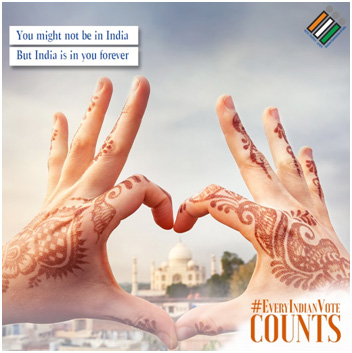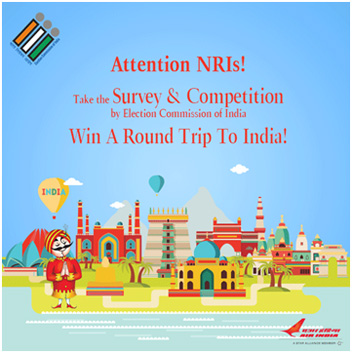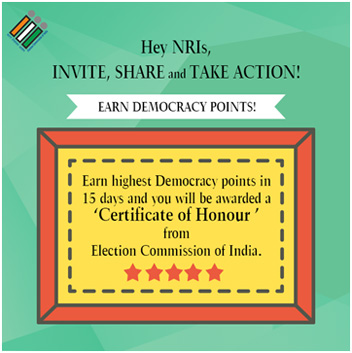
Global Knowledge Network On Voter Education - learning from each other
India's overseas citizens have emerged as a valuable strategic asset for the country in the last few decades. Acknowledging the major role played by them in nation-building, the Indian Parliament passed the Representation of People (Amendment) Bill in 2010 to also extend voting rights to the NRIs. They are eligible to be registered as a voter in the constituency in their place of residence in India as mentioned in their passport. Overseas electors are required to vote in person at the polling station on production of their original passport. Earlier, NRIs were not able to participate in election process due to the then prevailing law which required that only a citizen ordinarily resident within the territorial limits of a constituency in the country is eligible to be registered as voter in that constituency.
The Election Commission of India has made pioneering efforts at deepening Indian democracy in the recent past. Through its novel Systematic Voters' Education and Electoral Participation (SVEEP hereafter) initiative, the Commission has reached out to a vast section of citizens and registered voters, educating them about India's electoral process to enhance their awareness and participation in elections. One of the major focus areas of the programme is the vast participatory deficit among India's overseas electors in Indian elections.
A Non-Resident Indian (NRI) is a citizen of India who holds an Indian passport and has temporarily emigrated to another country for six months or more for employment, residence, education or any other purpose. There are approximately around 13 million NRIs who may broadly be classified as follows:
(a) highly skilled professionals, workers and students with tertiary and higher educational qualifications migrating to developed countries, particularly to the USA, UK, Canada, Australia and New Zealand – which boomed with the emigration of IT professionals in the 1990s.
(b) unskilled and semi-skilled workers going mostly to the Gulf countries and Malaysia, following the oil boom in the Gulf countries.
So far, registration and voting by Non Resident Indians (NRIs) has remained extremely limited.
The Survey
It is in this context the ECI decided to conduct an online survey among overseas Indian citizens, with the Tata Institute of Social Sciences, Mumbai primarily to identify the gaps in their awareness about India's electoral process, understand their political participation and to empirically capture their voting preferences. The objectives of the survey were as follows:
1) Assess the awareness levels among India's overseas electors about registration and voting in India.
2) Examine the gaps in awareness, motivation and participation of India's overseas electors in elections in India.
3) Gauge the opinions and preferences of India's overseas electors on the various options of casting their vote from abroad.
 To attract respondents 'competition' with prizes was introduced. The competition was also expected to crowd source creative ideas from overseas Indians on the theme of electoral participation, so that the same content could further be used for the campaign for increasing voter participation. Entries to the competition were accepted under six broad categories. Since the online competition aimed to engage the vast and diverse population of overseas Indians, a targeted approach was adopted, keeping in mind the demographic variations across countries and regions.
To attract respondents 'competition' with prizes was introduced. The competition was also expected to crowd source creative ideas from overseas Indians on the theme of electoral participation, so that the same content could further be used for the campaign for increasing voter participation. Entries to the competition were accepted under six broad categories. Since the online competition aimed to engage the vast and diverse population of overseas Indians, a targeted approach was adopted, keeping in mind the demographic variations across countries and regions.
The Website
ECI launched www.everyindianvotecounts.in to facilitate the online survey and competition. A comprehensive design was sought to connect with the overseas Indians thatwas developed roughly in one and a half month. An ethnographic approach was core to the website design development process that included in house workshops, meetings and user preference surveys to develop a language for the website.
 The Competition
The Competition
The online competition was conducted to invite creative ideas from overseas Indians on the theme of 'Every Indian Vote Counts'. It aimed to engage the vast and diverse population of overseas Indians by accepting original compositions under six broad categories.
- Slogans
- Songs
- Posters
- Photographs
- Short films
- Original Essays
To expand reach of the online survey and enhance participation, various activities were undertaken. Each activity gave the opportunity of earning 'Democracy Points' to the participant. At the end of every fortnight, the winner was awarded with a "Certificate of Honour" by the ECI.
 Upload a Selfie
Under the India United section of the website, participants were encouraged to upload their selfies with a caption based on the theme 'Every Indian Vote Counts'.
Upload a Selfie
Under the India United section of the website, participants were encouraged to upload their selfies with a caption based on the theme 'Every Indian Vote Counts'.
Community Action
The Community Action aimed at spreading the campaign by encouraging participants to upload group photograph
Refer a friend
Invite a friend to take the survey earned the respondents democracy points and recognition on the portal as well as ECI's Facebook page along with a certificate.
Share on Social Media
Share hashtag on Facebook and Twitter to spread the message and get more overseas Indians to take the survey
The Period of Campaign The website was launched on the 20th October 2016 and the survey was conducted between November 1, 2016 and December 31, 2016. A total of 2,649 respondents completed the survey between that time period. Since the website was active even in the first few weeks of January, the total number of responses was 2,973 (out of which 2,165 or 73% were eligible). Many participants made use of the contact us platform to clarify their queries on electoral procedure. Some extended their hand to volunteer in this initiative while others expressed their gratitude and shared their suggestions and good wishes.
The Findings
Competition: Many participants enthusiastically sent their entry in more than one category. More than 150 selfies were uploaded. Some of the participants uploaded old photographs of their time in India and others had uploaded pictures from their current country of residence. Indians spread across the globe expressed their love for the county through patriotic captions. The participants explicitly or implicitly welcomed the initiative and significance of voting with entries such as 'Waiting since long to be a part of electoral process' and 'Gul sa gulistan, hamara pyara hindustan'.
Survey: Three major findings of the Survey were:
There is only a very small fraction of overseas electors (3 per cent) that is well-informed about all aspects of the registration process. While most are aware about the minimum age of registration to be a voter, a relatively large section of India's passport holding diaspora remains largely unaware about the correct enrollment form meant for overseas electors and the eligibility criteria for becoming an Overseas Indian elector.
Secondly, the rates of registration as overseas electors are low (17 per cent). An overwhelming proportion of overseas electors (89 per cent) who wanted to vote at some point admitted to not being able to do so primarily because they were not present in India at the time of voting. The requirement of being physically present in their respective constituencies at the time of election has emerged as the greatest barrier to their electoral participation.
Thirdly, there's a gap between knowledge/attitude and practice. While the respondents report participating in online activities and consuming their news online (via social media) they were hesitant to complete the online registration form meant for overseas electors when prompted to do so. Intriguingly, it was respondents who were more knowledgeable about electoral procedures who were least likely to act on information when prime to do so. While greater research is needed to understand this paradoxical behaviour, this does seem to suggest that an online campaign must be complemented with offline activities in order for it to be truly effective.
The findings are being utilised to chalk out the action plan for designing the outreach programme for the overseas Indians to engage them with the Indian electoral process.
Padma Angmo
Director,
Election Commission of India.